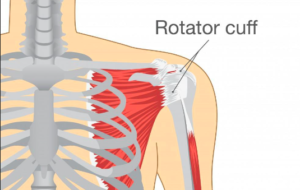Rotator Cuff Tears
What is the rotator cuff?
The rotator cuff refers to a group of 4 shoulder muscles that all play an important role in the movement of the shoulder. It acts as stability of the shoulder joint itself when the arm is in an elevated position. Since the rotator cuff has such an important role in shoulder function, it is very common for this structure to be injured. Perhaps one of the main types of injuries that can occur to this structure is a rotator cuff tear, which involves a tear in one or more of the tendons of the rotator cuff.
How do these tears occur?
Rotator cuff tears have 2 common occurrences: an acute injury where a fall or accident occurs or develops over time through gradual overuse. There are two ways that these tears can form, either in a partial thickness or full thickness tear. The tears are commonly in one of the muscles but can involve 2-3 depending on the injury type.
How do we treat a rotator cuff tear?
Conservative management is one of the most viable and recommended options in treating and recovering from a rotator cuff tear. The evidence shows a graduated strengthening program guided by a physiotherapist is the best first-line treatment. This involves:
- Gradually improving shoulder mobility and flexibility
- Strengthening the shoulder muscles itself to allow the shoulder to do day-to-day tasks
- Strength Training other muscles that provide support to the shoulder (eg: scapula muscles, deltoids)
- Hands-on techniques: While there are some hands-on treatments that can help in relieving pain, these are only temporary solutions.
Other treatment options:
- Medication: A GP may recommend anti-inflammatories for pain relief. While it can be useful in reducing pain, this is not a healthy long-term solution and does not result in the adaptations that are required for the shoulder to return back to normal function.
- Steroid injection: This is another form of anti-inflammatory treatment. While in certain circumstances these injections can help with pain reduction, unfortunately, this does not work for everyone. We do not recommend regular steroid injections as these can weaken the very tendons that we are trying to recover!
Do I need surgery?
The answer for this depends on the type of tear that you sustained with your injury.
- Partial thickness tear: It is quite uncommon for partial thickness tears requiring a surgical repair, even though it can still be quite painful! Partial tears will need a minimum of 4-5 months of consistent rehabilitation for significant results to occur. It is important to keep this in mind and not jump down the surgery pathway too quickly.
- Full thickness tears: Even with a full thickness tear, it is often recommended to perform a minimum of 2-3 months of physical rehabilitation. A physiotherapist will refer you to a specialist for a surgical opinion if:
- Physiotherapy exercises have not got you to your goals
- You have a large full thickness tear that is greater than 10mm, and you’re under the age of 65
- The mechanism of injury was a sudden, acute injury.
- You have a significant loss of shoulder strength and function.
If you have any questions regarding this or have sustained a rotator cuff injury yourself, please feel free to book an appointment to see one of our physiotherapists to get a tailored plan for you!


